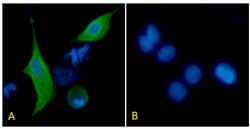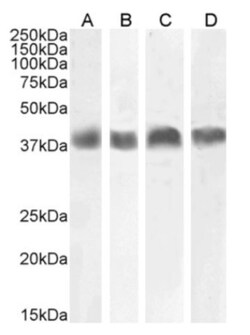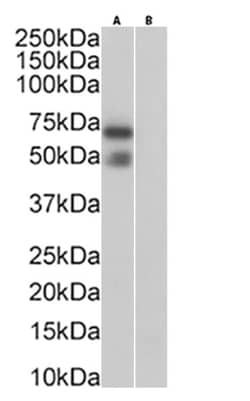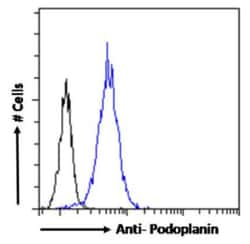Learn More
Invitrogen™ Podoplanin Chimeric Recombinant Rabbit Monoclonal Antibody (PMab-1)
Rabbit Recombinant Monoclonal Antibody
Supplier: Invitrogen™ MA548089
Description
Specificity: This antibody is specific for amino acids 38-51 (GDGMVPPGIEDKIT) of the platelet-aggregation-stimulating (PLAG) domain of mouse podoplanin (PDPN). This antibody, therefore, possesses high affinity and specificity for the MAP epitope tag (GDGMVPPGIEDK), which is derived from the PLAG domain of murine podoplanin. Preparation: This antibody was raised by immunising rats with 14-residue synthetic peptide mpp3851, which corresponds to amino acids 38-51 (GDGMVPPGIEDKIT) of the platelet-aggregation-stimulating (PLAG) domain of mouse podoplanin. Spleen cells were then harvested, and fused to P3U1 cells to generate stable hybridomas.
Podoplanin (PDPN, T1A, gp38, Aggrus) is a mucin type-1 glycoprotein with a 40-43 kDa molecular weight. Podoplanin is expressed in many tumors and normal cells, especially lymphatic epithelial cells and follicular DCs. Podoplanin localizes in stromal cells of peripheral lymphoid tissue and thymic epithelial cells. As a regulator of the lymphatic endothelium, podoplanin probably plays a role in maintaining the unique shape of podocytes. Podoplanin appears to serve as a ligand for CLEC-2 and expression is positively correlated with tumors expressing greater invasive and metastatic potential. Podoplanin is directly involved in cell migration, aids metastases formation and tumor cell invasion of tissue. Further, it has also been determined that podoplanin expression is induced through Src activation of Cas and, recently, there are indications of podoplanin presence on Th17 cells. Initial studies below indicate the presence of podoplanin on a small but distinct population of CD4+ cells from human PBMC. Dysfunction of the podoplanin protein has been linked to diseases such as lymphangioma and subglottis neoplasm. Podoplanin has also been proposed as a marker for lung injury due to the physiological function of the protein.
Specifications
| Podoplanin Chimeric | |
| Recombinant Monoclonal | |
| 1 mg/mL | |
| PBS with 0.02% ProClin 300 | |
| Q62011 | |
| PDPN | |
| This antibody was raised by immunising rats with 14-residue synthetic peptide mpp3851, which corresponds to amino acids 38-51 (GDGMVPPGIEDKIT) of the platelet-aggregation-stimulating (PLAG) domain of mouse podoplanin. | |
| 200 μg | |
| Primary | |
| Mouse | |
| Antibody | |
| IgG κ |
| ELISA, Flow Cytometry, Inhibition Assays, Immunohistochemistry, Western Blot, Immunocytochemistry | |
| PMab-1 | |
| Unconjugated | |
| PDPN | |
| 29kDa cytosolic podoplanin intracellular domain; Aggrus; CTA-520D8.1; E11; E11 antigen epitope; epithelial cell surface transmembrane protein antigen; glycoprotein 36; Glycoprotein 38; glycoprotein, 36-KD; GP36; Gp38; GP40; HT1A-1; hT1alpha-1; hT1alpha-2; lung type I cell membrane associated glycoprotein; lung type-I cell membrane-associated glycoprotein (T1A-2); Ots8; OTS-8; OTTHUMP00000009640; OTTHUMP00000044504; PA2.26; PA2.26 antigen; PDPN; PICD; Podoplanin; PSEC0003; PSEC0025; pulmonary type I alveolar epithelial cell transmembrane differentiation marker; RANDAM-2; RP23-348F1.2; RTI140; RTI40; T1a; T1A2; T1A-2; T1alpha; T1-alpha; TI1A; Transmembrane glycoprotein E11; type I cell 40 kDa protein | |
| Rabbit | |
| Protein A | |
| RUO | |
| 14726 | |
| Store at 4°C short term. For long term storage, store at -20°C, avoiding freeze/thaw cycles. | |
| Liquid |
Your input is important to us. Please complete this form to provide feedback related to the content on this product.



